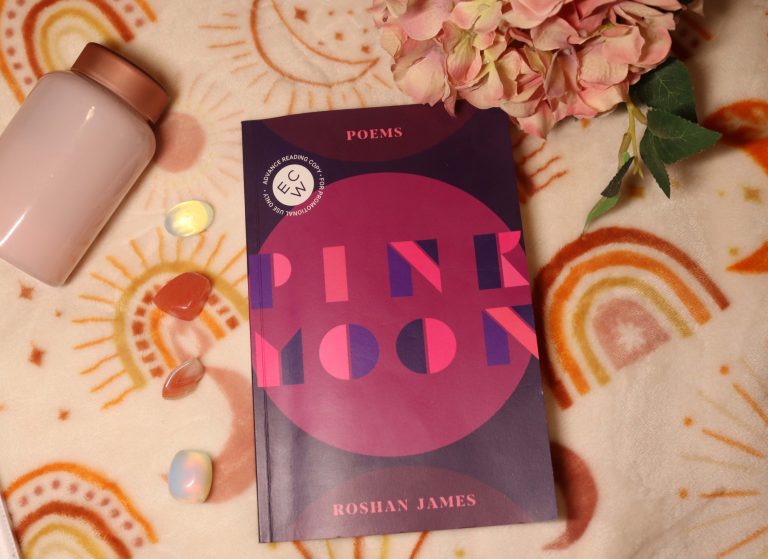Multi-hyphenate Roshan James recently released her collection of poetry into the open arms of her readers. Pink Moon is a non-fiction anthology of poems, written from James’ perspective as a spiritual woman of colour.
Her poems are a rumination on healing from Christianity and trying to decolonize her connection to the world. James fuses her lived experience as a Tibetan-Indian person born in Scarborough, Ontario with her connection to the South Asian diaspora.
On Sept. 20 the book officially launched in Toronto. There was a poetry reading and talk with Aashay Dalvi, the founder of Rad Riot Books as well as a live interview. Pink Moon is the perfect companion to a cozy night while there is a thunderstorm raging on outside. For fans of poetry, magic, spells and nature this 80-page poem anthology is like a breath of autumn air.
Poetry can be a daunting and overwhelming genre for everyone, bibliophiles included. This new age of poetry that does not strictly follow the classic poetry structures of old help make poetry more accessible. James writes in a way that makes her readers feel like they are reading her thoughts as they are being written. While some people find poetical language too “flowery”, the word choices in Pink Moon feel intentional and grounded.
James said the book release was surreal. After years of work James feels gratified and supported by the writing community at large. James wants to approach her book premiere in a slower-paced fashion.
Rather than doing a big book tour off the bat, she wants to interact with her readers in a more personal medium by doing a live reading of her poems to event attendees.
“[There’s] something about actually using my voice to deliver it is a different thing altogether,” James said.
James is the type of author who would allow you to customize her book to your liking. Dog-earing the pages is encouraged, and she will beat you to it. Reading Pink Moon can be a deeply personal experience. It almost feels like James is sitting and reading over your shoulder.
It takes a high level of skill to write simply. Rather than overcompensating by using long and complicated words, Pink Moon speaks directly to its reader.
When studying poetry in an undergraduate setting, student are usually bogged down with strict rules. For example, a Shakespearean sonnet must have fourteen lines, which must them be dived into four subgroups called “quatrains.”
Although there is beauty in the structure and value in rhymes, the new era of poetry that James inhabits invites more interpretation on the reader’s end. Some poems in Pink Moon are only six lines long, yet within the words whole stories and worlds are created.
Readers can feel secure when reading Pink Moon. Poems like “Saffron”, “A Song For Trees” and “Moon Ghost” really bring the reader in the middle of those woods right—each poem feels like indulging in communion with nature. James takes the category of non-fiction poetry and plays with it, adding bits of mysticism, fantasy and mythology into her writing.
Fellow artists like Janice Jo Lee have inspired her into mythologizing the life she leads.
“She said something about creating your own mythologies. The ability to mythologize about your past,” James said.
Alongside much of her work, Pink Moon was written in the backyard woods of James’ home. This special place is hers to meditate and walk around in.
Rather than practicing her readings in front of other people, she practiced reading her poems while surrounded by the trees. This helped put her into a tranquil mindset when she reads her work in front of a large crowd.
“Through my artwork, anything that I’m doing in community is to create space for traditionally marginalized voices, support anti oppression. I try to either lend my support, use my voice to help amplify what folks are doing, and supporting Indigenous, Black and radicalized creatives and creative professionals,” James said.
On a regular Tuesday James can be found processing ideas she had about a commissioned poetry request.
She is extremely excited to work with Charles Smith, a local artist who has a collection on display at the University of Waterloo. She was tasked with responding to Smith’s work through poetry.
Readers can look forward to this collaboration in November.

